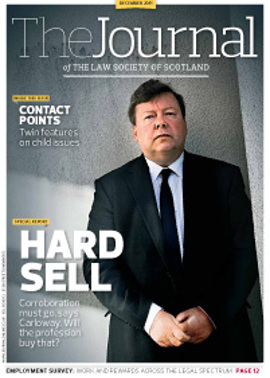Landlord splits

While the agricultural world has been holding its breath for the Inner House decisions in Salvesen v Riddell (effect of s 72(9) of the 2003 Act) and Morrison-Low v Paterson (the Moonzie rent review case), the Outer House has set out the rights inter se of joint landlords and how resumption may be effected, in Crewpace Ltd v French [2011] CSOH 133.
Crewpace concerned 2,386 acres of land at Rockside on Islay. A lease was assigned in 1997 to a company of which the defenders were directors. Ownership was then split between Crewpace and the defenders. The company was therefore tenant under a single lease of a holding in split ownership. The rent was formally apportioned. The defenders let part of their land to a distillery company, and sold off two plots without reference to Crewpace.
Joint interests
Crewpace sought declarator that the defenders had unlawfully interfered with their heritable interest as joint landlords. They contended that their interest in the lease was “common property” held by them and the defenders as “joint landlords”. They, therefore, had the same interest in the whole holding that they would have had as pro indiviso owners along with the defenders, so far as management, control and disposal of the land were concerned. The defenders argued that there was no right of common property where ownership was divided, albeit there were consequences for the tenant vis-à-vis the landlords.
The court held that there was no right that could be characterised as “the landlords’ interest” severable from the right of ownership. Such interest was inextricably linked to the title. It rejected the pursuers’ proposition that, by acquiring land that was subject to a tenancy involving that land and land owned by another, the owner acquired a right in respect of the other part. It held that the pursuers’ right was neither heritable nor, indeed, personal, but arose contractually, from the right to receive rent. A lease might impose restrictions on how a landlord could deal with his own land, but the concept that the landlord of one part gained an incorporeal heritable interest over the other part did not withstand scrutiny.
The correct characterisation of the parties’ positions was that the tenants had two landlords under one lease, one for each part of the farm, with (the rent having been apportioned) separate obligations to each landlord in that regard. The court distinguished the situation at Rockside from pro indiviso ownership, in which all pro indiviso proprietors must concur in any decision as to the management, alteration or disposal of let subjects (Clydesdale Bank v Davidson 1998 SC (HL) 51). There was no such rule in the circumstances of this case.
Resumption by agreement
The court also considered whether resumption could be effected by agreement, in the absence of notice to resume. The pursuers made no averment that the lease imposed any restriction on power of resumption, or that notice was required. The court therefore applied the common law, which did not require notice.
In doing so it followed Knapdale (Nominees) Ltd v Donald 2001 SLT 617, which stated that notwithstanding the peremptory language of s 21 of the 1991 Agricultural Holdings Act, where parties agreed to renunciation by the tenant, that was not challengeable later on the ground of failure to comply with the notice provisions therein. It extended the same principle to resumption, this being consistent with the view that the policy of the Act was to protect tenants from landlords interfering with security of tenure without due process. Where it was clear that no such protection was necessary because the parties had made their own arrangements, the legislation should not be so strictly interpreted as to allow contractual arrangements to be challenged. The undisputed facts were sufficient to infer that the defenders had agreed the resumptions with the tenants, with whom they had a close identity.
Amendment Bill
Parliament, too, has been busy. The Agricultural Holdings (Amendment) (Scotland) Bill was introduced on 31 October 2011. The bill contains three measures, to complete the agreement reached in the Tenant Farming Forum earlier this year for reform of the Agricultural Holdings Acts, commenced by the Public Services Reform (Agricultural Holdings) (Scotland) Order 2011. These extend the definition of “near relative”, where notice to quit follows succession, to grandchildren; prohibit “upwards-” or “landlord-only” rent reviews in limited duration tenancies; and provide that changes in rent resulting from the exercise or revocation of the option to tax by a landlord, or a change in the rate of VAT, do not qualify as “variation of rent” such as to interrupt the three years rent cycle. Consultation on the bill lasts until 16 December 2011. It is uncontentious.
In this issue
- Involving the named person
- Private investigators - mitigating the risks
- Human inventions
- Smoother passage
- Rough law of the street
- Council profile
- Opinion
- Book reviews
- President's column
- Mapping in the Land Register
- Alien concept
- Size does matter
- Case proved?
- Reading for pleasure
- Relocation revisited
- Where Parliament fears to tread...
- Cadder's growing family
- Landlord splits
- Five-year-old experts
- Common sense to the fore
- Beware: earn-outs
- Steering with one hand
- Scottish Solicitors' Discipline Tribunal
- Missives in motion
- Constitution on track
- From the Brussels office
- Law reform update
- Ask Ash
- Outside the box






